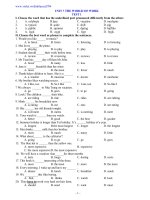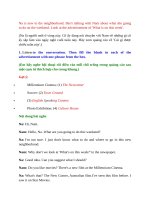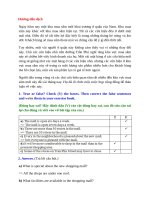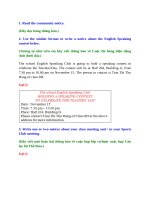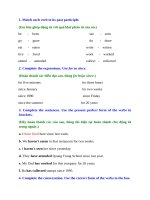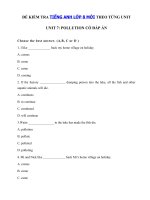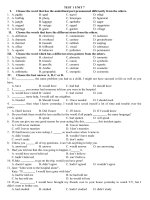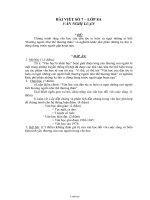TEST 1 UNIT 7 -lớp 8 - BT nghỉ covid 19
Bạn đang xem bản rút gọn của tài liệu. Xem và tải ngay bản đầy đủ của tài liệu tại đây (63.31 KB, 5 trang )
TEST 1 UNIT 7
I.
Choose the word that has the underlined part pronounced differently from the others.
1. A. paddy
B. sand
C. travel
D. tribal
2. A. buffalo
B. photo
C. limestone
D. botanical
3. A. jungle
B. luggage
C. sunbathe
D. sugar
4. A. around
B. various
C. sound
D. mountains
5. A. heritage
B. giant
C. garden
D. village
II.
Choose the words that have the different stress from the others.
1. A. definition
B. electricity
C. contaminate
D. radiation
2. A. dramatic
B. overhead
C. century
D. groundwater
3. A. thermal
B. beneath
C. rubbish
D. earplug
4. A. affect
B. billboard
C. visual
D. substance
5. A. aquatic
B. behavior
C. pollution
D. permanent
III.
Choose the word which has a different stress pattern from the others.
1. A. linguistic
B. classical
C. phonetic
D. romantic
2. A. fantastic
B. historic
C. comic
D. symbolic
3. A. oceanic
B. specific
C. ceramic
D. aquatic
4. A. terrific
B. Arabic
C. statistic
D. cosmetic
5. A. arithmetic
B. geographic
C. energetic
D. economic
IV.
Choose the best answer A, B, C or D.
1. If I
the same problem you had as a child, I might not have succeed in life as well as you
have.
A. have
B. would have
C. had had
D. should have
2. I
you sooner had someone told me you were in the hospital.
A. would have visited B. visited
C. had visited
D. visit
3.
more help, I would call my neighbor.
A. Needed
B. Should I need
C. I have needed
D. I should need
4.
then what I know yesterday, I would have saved myself a lot of time and trouble over the
years.
A. Had I known
B. Did I know
C. If I know
D. If I would know
5. Do you think there would be less conflict in the world if all people
the same language?
A. spoke
B. speak
C. had spoken
D. will speak
6. If you can give me one good reason for your acting like this,
this incident again.
A. I will never mention
B. I never mention
C. will I never mention
D. I don’t mention
7. If I had known you were asleep, I
so much noise when I came in.
A. didn’t make
B. wouldn’t have made
C. won’t make
D. don’t make
8. Unless you
all of my questions, I can’t do anything to help you.
A. answered
B. answer
C. would answer
D. are answering
9. Had you told me that this was going to happen, I
it.
A. would have never believed
B. don’t believe
C. hadn’t believed
D. can’t believe
10. If Jake
to go on the trip, would you have gone?
A. doesn’t agree
B. didn’t agree
C. hadn’t agreed
D. wouldn’t agree
11. Jane: “John went to the hospital alone”,
Katy: “If
, I would have gone with him”.
A. had he told me
B. he had told me
C. he has told me
D. he would tell me
12. If you
, I would have brought my friends over to your house yesterday to watch T.V, but I
didn’t want to bother you.
A. had studied
B. studied
C. hadn’t studied
D. didn’t study
13. Peter: “Did you need help with your Math last night?”
Mary: “If I had needed, I
you".
A. would call
B. called
C. would have called D. will call
14. If someone
into the store, smile and say, “May I help you?”
A. comes
B. came
C. come
D. should come
15. “Here’s my phone number”.
“Thanks. I’ll give you a call if I
some help tomorrow”
A. will need
B. need
C. would need
D. needed
16. If I didn’t work for an accounting firm, I
in a bank now.
A. work
B. will work
C. have worked
D. would work
17. The death rate would decrease if hygienic conditions
improved.
A. was
B. is
C. were
D. had been
18. The education in Japan
if the basic principles of education had not been taken into
consideration.
A. would go down
B. would have gone down
C. went down
D. had gone down
19. If there
, the rice fields could have been more productive.
A. had been enough water
B. were enough water
C. would be enough water
D. are enough water
20. The patient will not recover unless he
an operation.
A. had undergone
B. would undergo
C. undergoes
D. was undergoing
21. If she
him, she would be very happy.
A. would meet
B. will meet
C. met
D. should meet
22. If he
a thorough knowledge of English, he could have applied for this post.
A. had had
B. had
C. has
D. has had
23. If I had enough money, I
abroad to improve my English.
A. will go
B. would go
C. went
D. should have go to
24. The bench would collapse if they
on it.
A. stood
B. stand
C. standing
D. stands
25. If it
convenient, let’s go out for a drink tonight.
A. be
B. is
C. was
D. were
V.
Complete the sentences with the correct verb form in the bracket.
1. If we meet at 9:30, we (have)
plenty of time.
2. If you (find)
a pen in the cellar, don’t mention it to anyone.
3. The zookeeper would have punished her with a fine if she (feed)
the animals.
4. If you pass your examination, we (have)
a celebration.
5. Lisa would find the milk if she (look)
for it in the fridge.
6. What (happen)
if I press this button?
7. The door will be unlocked if you (press)
the green button.
8. I should have voted for her if I (have)
a vote then.
9. If you go to Paris, where you (stay)
?
10. If you (swim)
in this lake, you’ll shiver from cold.
11. Unless you (tell)
the truth, I won’t help you.
12. You’ll get pneumonia if you (not change)
your wet clothes.
13. If I had known that you couldn’t eat octopus, I (not buy)
it.
14. If they (hang)
that picture lower, people would be able to see it.
15. She (be)
able to walk faster if she didn’t have such high-heel shoes.
16. I (bring)
you some beer if I had known that you were thirsty.
17. If you had touched that electric cable, you (be)
electrocuted.
18. If the story hadn’t been true, the newspaper (not print)
it.
19. I (not buy)
things on the installment system if I were you.
20. Dan (arrive)
safe if he drove slowly.
Correct the verbs form to complete the sentences.
1. If you (go)
away, please write to me.
2. If he (eat)
another cake, he will be sick.
3. I (not do)
that if I (be)
you.
4. If he (take)
my advice, everything can go well.
5. He never does homework. If he (do)
his homework, he (not worry)
about his exam.
6. What you (do)
if she refuses your invitation?
7. If today (be)
Sunday, we (go)
to the beach.
8. Unless they (pass)
their examinations, they would join the army.
9. You (be)
ill if you drink that water.
10. If Tom (go)
to bed earlier, he would not be so tired.
11. If it’s raining heavily, we (not go)
for a donkey ride.
12. If he (try)
hard, he’ll pass the examination.
13. I could understand the French teacher if she (speak)
more slowly.
14. If I (finish)
the work in time, I (go)
to the football game.
15. If you (see)
Mary today, please (ask)
her to call me.
VII.
Complete the sentences with the correct verb form in the bracket.
1. If someone offered to buy you one of those rings, which you (choose)
?
2. The flight may be cancelled if the fog (get)
thick.
3. If the milkman (come)
, tell him to leave two pints.
4. I (call)
the office if I were you.
5. Someone (sit)
on your glasses if you leave them there.
6. You would hear my explanation if you (not talk)
so much.
7. What you (do)
if you hear the burglar alarm?
8. If you (read)
the instructions carefully, you wouldn’t have answered the wrong
question.
9. If Mel (ask)
her teacher, he’d have answered her questions.
10. I would repair the roof myself if I (have)
a long ladder.
11. Unless they turn that radio off, I (go)
mad.
12. If you were made redundant, what you (do)
?
13. We’ll have a long way to walk if we (run)
out of petrol here.
14. If you shake that bottle of port, it (not be)
fit to drink.
15. If you spoke louder, your classmates (understand)
you.
16. I’ll probably get lost unless he (come)
with me.
17. You (not have)
so many accidents if you drove more slowly.
18. If you (wear)
a false beard, nobody would have recognized you.
19. If she (leave)
the fish here, the cat will eat it
20. You (have)
no trouble at school if you had done your homework.
VIII.
Fill in each blank with the correct preposition.
1. Land pollution is responsible for damage done
natural habitat of animals.
2. Americans throw
twenty-eight and a half million tons of plastic in landfills every year.
3. Scientists have come up
new ways of saving energy.
4. Thousands of people were exposed
radiation when the nuclear plant exploded.
5. Waste water from many factories which is dumped
water bodies directly causes water
pollution.
IX.
Read the passage and complete the sentences. True (T) or false (F).
Air pollution is a serious problem in many cities. Motor vehicles, factories and other sources create so
much air pollution that it may hang in the air like dirty fog. Air pollution threatens the health of the people
who live in cities. City wastes cause water pollution when they are poured into the waterways. These wastes
kill fish and make some areas unfit for swimming. In addition, many large cities have difficulties in disposing
of their garbage. The amount of garbage grows each year, but places to put it are quickly filling up. Citizens,
VI.
governments, industries, scientists, and business people must work together in different ways to gradually
reduce pollution. For example, most cities have introduced recycling programmes.
1. Motor vehicles and factories are among some sources of air pollution.
2. Air pollution doesn’t endanger people’s health in some cities.
3. Air pollution is the only problem of the environment mentioned in this passage.
4. Garbage disposal is a problem in many large cities.
5. Everyone must cooperate to reduce pollution.
6. We can reduce pollution by recycling programmes only.
X.
Choose the word or phrase among A, B, C or D that best fits the blank space in the following
passage.
Light pollution is not (1)
serious as water or air pollution. (2)
, it is the type of pollution
that (3)
more in cities than in rural areas. In the past, we could sit out at night and (4)
at glittering stars in the sky and light from objects in the outer space. Nowadays, cities are covered with
lights from buildings, streets, advertising displays, many of which direct the lights up into the sky and into
many unwanted places. The real problem is that it is very (5)
to apply light to almost everything
at night. Millions of tons of oil and coal (6)
to produce the power to light the sky. Eye strain,
(7) of vision and stress are what people may get from light pollution. (8)
light at night can harm our
eyes and also harm the hormones that help us to see things properly.
1. A. as
B. more
C. much
D. only
2. A. Moreover
B. However
C. Therefore
D. Nevertheless
3. A. happen
B. occur
C. occurs
D. is occurred
4. A. watch
B. see
C. spend
D. gaze
5. A. waste
B. wasteful
C. wasting
D. wastes
6. A. used
B. using
C. is used
D. are used
7. A. lose
B. lost
C. loss
D. losing
8. A. Very much
B. Too much
C. Too many
D. So many
XI.
Read the following passage and then answer the questions below it.
Air pollution is a cause of ill-health in human beings. In a lot of countries there are laws limiting the
amount of smoke which factories can produce. Although there isn’t enough information on the effects of
smoke in the atmosphere, doctors have proved that air pollution causes lung diseases.
The gases from the exhausts of cars have also increased air pollution in most cities. The lead in petrol
produces a poisonous gas which often collects in busy streets surrounded by high buildings. Children who live
in areas where there is a lot of lead in the atmosphere cannot think as quickly as other children and they are
clumsy when they use their hands.
There are other long-term effects of pollution. If the gases in the atmosphere continue to increase, the
earth’s climate may become warmer. A lot of the ice near the Poles may melt and may cause serious floods.
1. What can make people sick?
____________________________________________________
2. Where does smoke come from?
____________________________________________________
3. Can air pollution cause lung diseases?
____________________________________________________
4. What else can cause air pollution in cities?
____________________________________________________
5. Why does the earth’s climate become warmer?
____________________________________________________
XII.
Read the passage, and choose the correct answer A, B, C or D for each question.
Saving the Environment: One Home at a Time
Pollution can be seen not only throughout the world, but also in our own homes. It comes from household
chemicals, the amount of water people use and the waste people produce and throw away. What can be done to
stop this pollution? Surprisingly, a person can help save the environment by doing simple things.
First, we need to recycle, which allows products to be used over and over again. Recycling can also reduce
the number of trees cut down to produce paper products. It takes very little effort. It is not hard to place plastic
and glass bottles, aluminum cans and paper in a bin. Anyone can do it.
Second, we need to watch the amount of water used at home. It can be conserved by taking short showers
instead of baths, repairing leaky faucets, using the dishwasher or washing machine only when fully loaded, or
simply turning the faucet off while brushing your teeth.
Third, we need to reduce waste. We need to recycle whenever possible, but should also try to use this
waste effectively. For example, grass clippings and food scraps can be made into compost for plants. The
average person produces 4.3 pounds of waste every day, but we can reduce that amount by recycling and
reusing.
If we do our part in our own homes, we can help keep the planet from becoming more polluted.
1. Pollution is caused from the following sources except
.
A. water in rivers
B. water from households
C. wastes
D. house chemicals
2. Recycling can help us
.
A. never cut down trees
B. produce more paper products
C. place garbage bins easily
D. use products again and again
3. In order to save water, we can do all of the following things except
.
A. fully use the washing machine
B. repair leaky faucets
C. take short showers instead of baths
D. turn the faucet off while brushing your teeth
4. Recycling helps to reduce waste because
.
A. plants need to develop
B. waste can be recycled and reused
C. a person can do it in his home
D. an average man produces compost for plants
5. The word “It” in paragraph 2 refers to
.
A. cutting down
B. the number
C. recycling
D. effort

